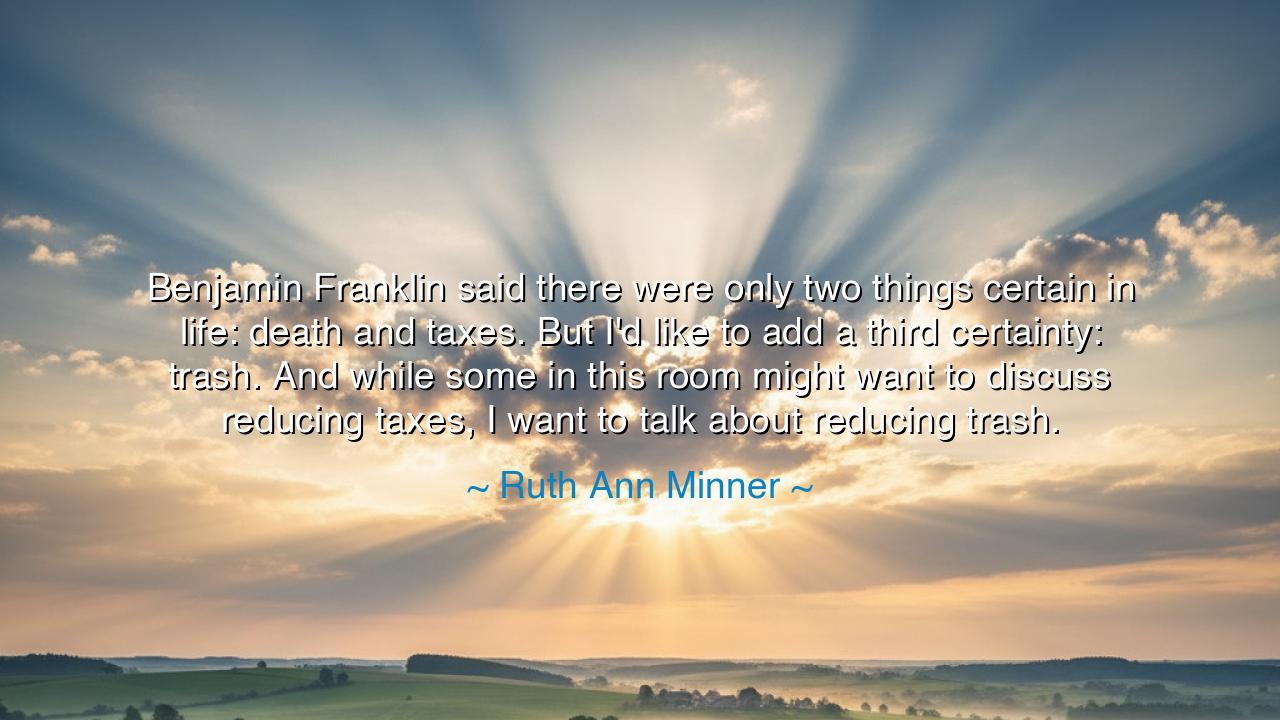
Benjamin Franklin said there were only two things certain in
Benjamin Franklin said there were only two things certain in life: death and taxes. But I'd like to add a third certainty: trash. And while some in this room might want to discuss reducing taxes, I want to talk about reducing trash.






“Benjamin Franklin said there were only two things certain in life: death and taxes. But I’d like to add a third certainty: trash. And while some in this room might want to discuss reducing taxes, I want to talk about reducing trash.” — so declared Ruth Ann Minner, the first female governor of the state of Delaware, a leader who rose from humble beginnings to stand at the helm of public service. Her words, though wrapped in humor, carry the gravity of wisdom. For in this statement lies both the humility of the practical and the vision of the prophetic — a recognition that waste, in its many forms, has become one of humanity’s most enduring legacies. Where Franklin once spoke of death and taxes as the inescapable truths of life, Minner saw fit to add a modern certainty — the growing mountain of trash, the mark of a civilization both ingenious and heedless of its own excess.
The origin of this quote comes from Minner’s environmental policy address during her time as governor, a moment when she sought to awaken the public to an uncomfortable truth. She had lived a life close to the earth — once a sharecropper, later a businesswoman, and finally a public servant — and she understood that progress without stewardship is a hollow victory. While others in political halls debated the abstractions of budgets and taxes, she turned to what was tangible: the overflowing landfills, the littered highways, the rivers choked with refuse. In invoking Franklin’s timeless phrase, she placed trash alongside the great inevitabilities of existence — not merely as a jest, but as a mirror held up to the age of consumption.
To speak of trash is to speak not only of refuse, but of responsibility. It is the byproduct of our desires, the physical echo of our choices. Every package thrown away, every forgotten item, every discarded convenience is a small testament to a larger truth: that humanity, in its pursuit of comfort and abundance, leaves behind traces of its own neglect. Death and taxes are natural and political certainties, but trash — that is a spiritual one. For it reflects the state of our inner world. As we clutter the earth, so too do we clutter our souls with excess — with greed, with apathy, with the illusion that what we cast away simply disappears.
The ancients knew better. In the cities of Athens and Rome, laws were made to ensure cleanliness and civic duty, for they understood that the purity of a city’s streets mirrored the purity of its governance. In Japan, for centuries, the philosophy of mottainai — the deep regret over waste — guided both artisans and peasants alike, reminding them that everything, from a grain of rice to a scrap of cloth, held sacred worth. And yet, in the modern age, this reverence has waned. We have learned to build machines that outlast our lifetimes, but not the wisdom to keep our creations from overwhelming us. Thus, Minner’s words are not merely a policy statement — they are a moral reminder that stewardship is the duty of every generation.
It is no accident that she speaks of this in the language of certainty. For if trash is inevitable, then so too must be our effort to reduce it. To deny the permanence of waste is to deny the shadow of our own existence. But to confront it — to face it with intention and humility — is to reclaim our dignity as caretakers of creation. Just as Franklin urged prudence in life’s practical affairs, Minner urges prudence in our treatment of the earth. For waste, if left unchecked, becomes a quiet tyranny, consuming both land and spirit. To reduce trash is not simply an environmental act; it is a spiritual discipline, a rebalancing of our relationship with the world that sustains us.
Consider the story of the city of San Francisco, which declared a goal of zero waste — a dream many dismissed as impossible. Yet through education, innovation, and the will of its people, the city transformed its habits: recycling, composting, and reusing became second nature. Though the goal is not yet fully achieved, the transformation stands as proof that what seems inevitable can be challenged. Minner’s wisdom lives in such efforts — that while trash may be certain, its dominion over us need not be. The certainty lies not in our failure, but in our choice to act.
Therefore, my listener, take this teaching not as jest but as truth. Each life leaves behind remnants — of action, of matter, of memory. The question is not whether we will leave a mark, but what kind of mark it will be. Learn to live lightly upon the earth. Reuse what can be reused. Repair what can be repaired. Honor the materials that serve you, and return to nature what rightfully belongs to her. For as Ruth Ann Minner teaches, we cannot escape trash, but we can learn to master it — not by denial, but by discipline, by respect, and by the wisdom to see the sacred in the mundane.
So let her words echo beyond their moment of laughter: Death, taxes, and trash — these are the constants of life. But only one of them lies within our power to change. Let each generation, then, strive to lessen the weight of what it leaves behind, so that when the time of reckoning comes — when our own dust returns to dust — the earth may say of us, They lived well. They wasted little.






AAdministratorAdministrator
Welcome, honored guests. Please leave a comment, we will respond soon